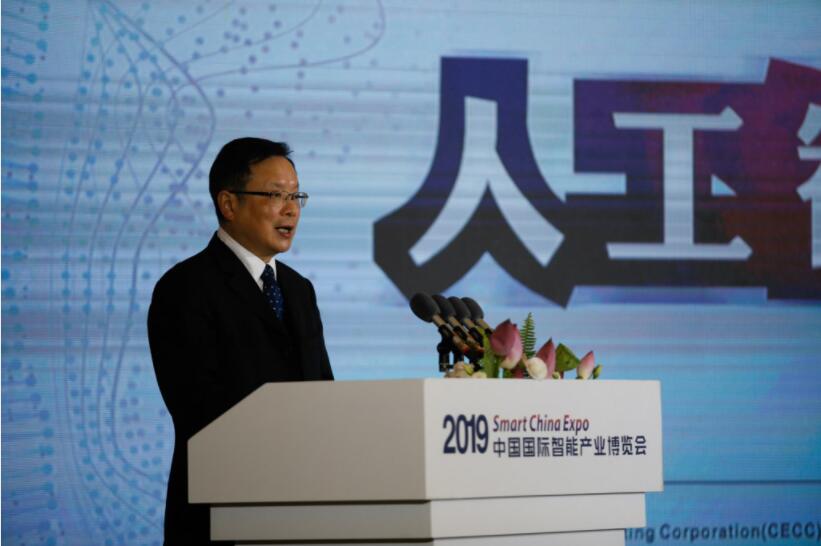Chongqing — An Industry Development and Cooperation Forum on August 27, 2019, brought together leaders from many corners of the artificial intelligence industry to discuss the current state and prospects of the industry, tech research, ethical issues, and policy suggestions. The forum was an opportunity to “pool together wisdom and strength.”

Vice mayor of Chongqing government, Qu Qian, gives the opening remarks at the Industry Development and Cooperation Forum August 27, 2019. Photo by Deng Wentao
The first speaker, Vice President and Secretary-General of China International Economic Exchange Center Zhang Dawei said he admires the Chongqing government for its broad vision, and that the expo and that particular forum reflects the needs of the AI industry which increased 48 % this year and will become the economic engine for China’s future growth. He introduced a few major areas of development in AI, including, voice recognition, auto driving, and the ability for AI to increase industrial capacity.
Pushing forward might include focusing on infrastructure, talent, training, and refining industry standards. “AI will be the future of human beings; we should focus on the shared future of the human community,” Zhang said. “The market potential has not yet been significantly tapped. We should be open-minded and come together in cooperation and fairness to achieve the win-win.”
Meng Pu, Chairman of Qualcomm China, said the world had seen many technological advancements in the field of communication in the last 30 years, with inventions like the internet, smartphones, and arguably social media. How people and things connect may not change so much soon, but the strength of the connection will, he said. The super speeds of 5g enable big data research such as how we measure air pollution, massive infrastructure systems and will change the way cities are managed. These changes to technology will also transfer to the economy, he said. By the year 2035, 5g is projected to increase the economy by 12 trillion dollars globally and create more than 9.5 billion jobs for China domestically.
Li Deyi spoke about the future of transportation and intelligent networks and specifically broke down the process of potential market disruption of self-driving cars. Although it may seem the self-driving cars could be on the roads tomorrow there are a few steps that come before, said Li. “Currently it is difficult to reduce the cost of self-driving cars to make them available to consumers, but eventually mass production will make it cheaper,” he said.
Li envisions a future smart Chongqing transportation system. “Chongqing is a smart city,” he said, “and soon all buses in Chongqing, maybe by 2033, 70% of all buses will be autonomous in Chongqing.”
One issue that still needs to be addressed in consumer’s minds is safety, which Li thinks will solve itself once the consumer population inspects the data more closely.
“There will always be accidents,” said Li, “The airplane is one of the safest modes of transportation, but accidents still happen.” He believes that self-driving cars will prove to be statistically much safer than consumer operated vehicles and that it is only a matter of time until that data is available.
Dr. Chang presented current research and developments in the field, and suggested areas that should be addressed to support industry development. He asked, “What are the standards that we should be instituting?” Some examples of ethics in tech include data security and data collection. “This topic is uncharted water. There are potential problems and risks there. We need to raise people’s awareness of privacy issues,” he said, “And on the other side, AI can strengthen security and privacy.”
One common public misconception that needs to be addressed to bring the governments and the people of the world behind the AI industry is that AI will cause mass unemployment. “AI will not result in mass unemployment,” he said, “Although in the short term AI may cause structural employment problems as it begins to replace human labor. People in the banking, service, and manufacturing industries.”
However, in the long run, Dr. Chang, citing early statistics, explained that AI would create many jobs both domestically and globally.
In his closing, he expressed the important role of international cooperation in progress.
“The Chinese government has attached great importance to AI development. AI in Chongqing is progressing rapidly. All the provinces have an AI industry, and the domestic growth is around 30% growth each year,” he said. “However, we need an open environment [internationally] for further development. And we need to work together to solve the problems.”


